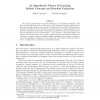Free Online Productivity Tools
i2Speak
i2Symbol
i2OCR
iTex2Img
iWeb2Print
iWeb2Shot
i2Type
iPdf2Split
iPdf2Merge
i2Bopomofo
i2Arabic
i2Style
i2Image
i2PDF
iLatex2Rtf
Sci2ools
FOCS
1999
IEEE
1999
IEEE
An Algorithmic Theory of Learning: Robust Concepts and Random Projection
We study the phenomenon of cognitive learning from an algorithmic standpoint. How does the brain effectively learn concepts from a small number of examples despite the fact that each example contains a huge amount of information? We provide a novel algorithmic analysis via a model of robust concept learning (closely related to "margin classifiers"), and show that a relatively small number of examples are sufficient to learn rich concept classes. The new algorithms have several advantages -- they are faster, conceptually simpler, and resistant to low levels of noise. For example, a robust half-space can be learned in linear time using only a constant number of training examples, regardless of the number of attributes. A general (algorithmic) consequence of the model, that "more robust concepts are easier to learn", is supported by a multitude of psychological studies.
Algorithmic Standpoint | FOCS 1999 | Robust Concepts | Small Number | Theoretical Computer Science |
Related Content
| Added | 03 Aug 2010 |
| Updated | 03 Aug 2010 |
| Type | Conference |
| Year | 1999 |
| Where | FOCS |
| Authors | Rosa I. Arriaga, Santosh Vempala |
Comments (0)

